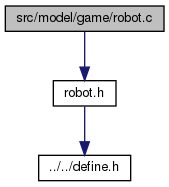#include "robot.h"
Data Structures | |
| struct | robot_impl |
Function Documentation
◆ check_collision_robots()
Take 2 robots [rob1] and [rob2] and will check if there is a collision between them. Return true if there is one, false if there is none.
◆ create_robot()
| robot* create_robot | ( | double | x_1, |
| double | y_1, | ||
| double | angle, | ||
| int | speed, | ||
| int | id, | ||
| char * | r_name | ||
| ) |
Allocate a robot in memory and assign [x_1] and [y_1] to its coordinate, [angle] as its angle, [speed] as the speed and [id] as the robot number.

◆ decrement_nb_missile()
| void decrement_nb_missile | ( | robot * | rob | ) |
Decrement the number of missile of the robot [rob] by 1.
◆ degree_to_radians()
| double degree_to_radians | ( | double | x | ) |
take a radius [x] in degree and return its value in radian
◆ destroy_robot()
| void destroy_robot | ( | robot ** | rob | ) |
Free a robot allocate in memory.
◆ get_robot_angle()
| double get_robot_angle | ( | robot * | rob | ) |
Return the angle of the robot [rob].
◆ get_robot_health_points()
| unsigned int get_robot_health_points | ( | robot * | rob | ) |
Return number of health points of the robot [rob].
◆ get_robot_id()
| int get_robot_id | ( | robot * | rob | ) |
Return the identifier of the robot [rob].
◆ get_robot_name()
| char* get_robot_name | ( | robot * | robot | ) |
Return the robot's string name.
◆ get_robot_nb_missiles()
| int get_robot_nb_missiles | ( | robot * | rob | ) |
Return the number of missiles active of the robot [rob].
◆ get_robot_pos()
Put the coordinate as a point of a robot [rob] into a point [pos].
◆ get_robot_speed()
| int get_robot_speed | ( | robot * | rob | ) |
Return the speed of the robot [rob].
◆ get_waiting_time_robot()
| int get_waiting_time_robot | ( | robot * | rob | ) |
Return the waiting time of the robot [rob].
◆ increment_nb_missile()
| void increment_nb_missile | ( | robot * | rob | ) |
Increment the number of missile of the robot [rob] by 1.
◆ inflict_damage_from_collision()
It'll inflict [collision damage] to [rob1] and [rob2] and reduce their speed to 0. Else it'll do nothing.
◆ inflict_damage_from_missile()
Take the position of an explosion [p] and a robot [rob], and will inflict damage relative to his position to the explosion point.
◆ modify_angle()
| void modify_angle | ( | robot * | rob, |
| double | angle | ||
| ) |

◆ modify_speed()
| void modify_speed | ( | robot * | rob, |
| int | speed | ||
| ) |

◆ peek_memory_at()
| int peek_memory_at | ( | robot * | rob, |
| int | i | ||
| ) |
Return the value stocked at the indice i of the robot [rob]'s memory. If an indice is invalid, it'll return -1.
◆ poke_memory_at()
| bool poke_memory_at | ( | robot * | rob, |
| int | data, | ||
| int | pos | ||
| ) |
Set the integer [data] to the indice [pos] in the robot [rob]'s memory. If the indice given is invalid (i.e, not contained between 0 and robot_memory), the operation will fail and it'll return false. If the operation succeed, it'll return true.
◆ set_robot_angle()
| bool set_robot_angle | ( | robot * | rob, |
| double | angle | ||
| ) |
Set the robot [rob]'s angle to [angle]. If the angle is invalid (i.e, not contained between 0 and 359), the operation will fail and it'll return false. If the operation succeed, it'll return true.

◆ set_robot_speed()
| bool set_robot_speed | ( | robot * | rob, |
| int | speed | ||
| ) |
Set the robot [rob]'s speed to [speed]. If the speed is invalid (i.e, not contained between 0 and MAX_SPEED), the operation will fail and it'll return false. If the operation succeed, it'll return true.

◆ set_waiting_time_robot()
| void set_waiting_time_robot | ( | robot * | rob, |
| unsigned int | waiting_time | ||
| ) |
set the waiting_time of a robot [rob] to the value of [waiting_time].
◆ update_pos_robot()
| void update_pos_robot | ( | robot * | rob | ) |
Update the position of a robot [rob] to its next iteration, if he is percuting a wall, it will inflict him [Collision_damage] as defined in define. If there is a waiting time, it'll do nothing and only decrease the current waiting time.

 1.8.19
1.8.19